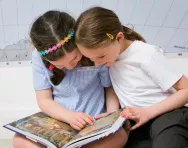TheSchoolRun.com closure date
As we informed you a few months ago, TheSchoolRun has had to make the difficult decision to close due to financial pressures and the company has now ceased trading. We had hoped to keep our content available through a partnership with another educational provider, but this provider has since withdrawn from the agreement.
As a result, we now have to permanently close TheSchoolRun.com. However, to give subscribers time to download any content they’d like to keep, we will keep the website open until 31st July 2025. After this date, the site will be taken down and there will be no further access to any resources. We strongly encourage you to download and save any resources you think you may want to use in the future.
In particular, we suggest downloading:
- Learning packs
- All the worksheets from the 11+ programme, if you are following this with your child
- Complete Learning Journey programmes (the packs below include all 40 worksheets for each programme)
You should already have received 16 primary school eBooks (worth £108.84) to download and keep. If you haven’t received these, please contact us at [email protected] before 31st July 2025, and we will send them to you.
We are very sorry that there is no way to continue offering access to resources and sincerely apologise for the inconvenience caused.
Your starting school action plan

Starting school is a big milestone for every child, so it’s important to get it right.
For most families, this means that the process of choosing and applying for schools and preparing your child for their first day is a lengthy one.


Claim A FREE Starting School Scrapbook!
- Packed with colourful activities
- Focuses on early English, maths & science skills
- Supports your child’s physical and social development
So what should you be doing to make sure you’re paving the way for a successful primary school experience?
Starting school timetable: as early as possible
Start researching your options
Although schools can change significantly in a relatively short time span, it’s never too early to start finding out about the options in your area. ‘Canny parents will think about schools even before moving to a new area,’ says Susan Hamlyn, director of the Good Schools Guide Advice Service. Your Local Authority’s website will have a list of all your nearby schools; from there, you can visit their individual websites to get an initial impression of what they’re like, and request a prospectus.
Read BBC Bitesize Starting Primary School's guide to applying for a primary school place in the UK for a detailed overview of the application process.
Check out Ofsted reports
They’re not the be-all-and-end-all, but Ofsted reports are a good place to start when looking at schools. As well as assessing the school’s academic standards, they also give an overall picture of school life, including behaviour, pastoral care and leadership – but bear in mind that reports won’t tell you everything there is to know about a school. You can also look at Parent View, the Ofsted website which reports parents' views of schools.
Find out about admissions criteria
Different schools and Local Authorities have different admissions criteria, so before you set your heart on a particular school, it’s sensible to check these out. For example, faith schools often give priority to families who attend church regularly for a set period, and require authorisation from the head of the congregation.
Go along to school events
‘All schools have events such as summer fetes, Christmas fairs and Guy Fawkes celebrations,’ explains Susan. ‘As a prospective parent, going along to these is a good way to get a flavour of what the school is like.’
Starting school timetable: autumn term
Applications open
The date on which primary school applications open varies between areas, but is usually midway through the autumn term. If your child is the right age to start Reception, the Local Authority should notify you directly about how to apply. ‘Bear in mind that you don’t gain any advantage by getting your form in early, so take the time to research all your options before you fill it in,’ Susan advises. You can list up to six schools, and it makes sense to do so: if you only list one or two schools and don’t get a place, you may end up being offered something less desirable or further from home.
Go to open days
Visiting the schools in your area is essential before you apply for places. It’s a good idea to check out all your options, even if you have a strong preference: this will help to inform your second and subsequent choices, and also, you may be surprised by what you see. ‘Good things to look for are a sense of calm and order, where teachers and pupils seem to work collaboratively and the school runs smoothly’ says Susan.
Do some spot checks
You can also gain a lot of information about a school through casual visits, such as walking past at the beginning or end of the school day, or during break time. ‘Look at the way the children behave on the way into and out of school, and how they interact in the playground,’ suggests Susan. ‘Is there enough space? Is there evidence of children being isolated or bullied? Can you picture your child there?’
Don’t forget the SIF
Some primary schools – mainly faith schools – require you to fill in a Supplementary Information Form (SIF) as well as the Local Authority application form. These have to be returned directly to the school, so make sure you find out if you need to complete a SIF otherwise your child may miss out on a place that they would have been entitled to.
Starting school timetable: January
Applications close
Primary school applications close on the same day nationwide, around the middle of January. Make sure you get your application – including SIF, if necessary – in by this date, and allow time for unexpected delays, such as computer problems. If you miss the deadline without good reason, your child’s application will be marked as late, which may affect their school offer.
Starting school timetable: April
Offers day
Reception places are offered on the same day in all areas. If you applied online, your offer will be emailed to you or will be available online; postal offers are sent out on the same day, so will be received a day or so later.
Accept the offer
You have a set period of time to accept your child’s primary school place. This is usually done online and has to be completed within a few weeks of the place being offered to you. Remember that your child’s place isn’t confirmed until you’ve accepted it.
Your child might not get a place at your preferred school (around 9% of school starters aren't offered their first choice when applying to primary school), but it's important to be positive about the place you have been offered. The BBC Bitesize guide to talking to your child about their school place offers tips to help you get over your disappointment and build your child's excitement about starting school.
In a very small number of cases children aren't offered a place at any local school; read our parents' guide to what to do if your child isn't offered a Reception place.
Consider an appeal
If you’re not happy with the school your child has been offered, you’ll need to decide whether to appeal. ‘Do look carefully at what you’ve been offered, as it may be better than you think,’ says Susan. If you do want to appeal, your Local Authority will tell you how to go about it. It’s important to accept the school you’ve been given, even if you’re appealing – this doesn’t prejudice your appeal, and ensures that your child has somewhere to go if you’re unsuccessful. It’s also a good idea to check with the Local Authority that your child is still on your preferred school’s waiting list.
Starting school timetable: summer term and beyond
Go to settling-in sessions
Schools all have their own ways of familiarising new starters with the school environment and routines. Some offer individual meetings with the teacher, at home or at school; others invite children to spend a morning in the classroom with the current Reception pupils.
Order the uniform
Crested and logoed kit generally comes from a recommended supplier and may take a while to deliver. Go through the school uniform list in good time and make sure you order everything you need, including less obvious items like PE bags and name tapes.
Start getting excited!
As the big day grows nearer, you and your child may be feeling excited and nervous in equal measure. Now is the time to start preparing them for their new life as a Reception child and teaching them the basic skills they need so they’re full of confidence when September comes around.
Read and watch to help your 'baby' picture themself as a schoolchild!
Reading starting school books, playing a game like BBC Bitesize's My First Day at School or watching videos of primary-school children introducing aspects of school life are all great ways to help your child begin to picture their classroom and daily routine at school.








